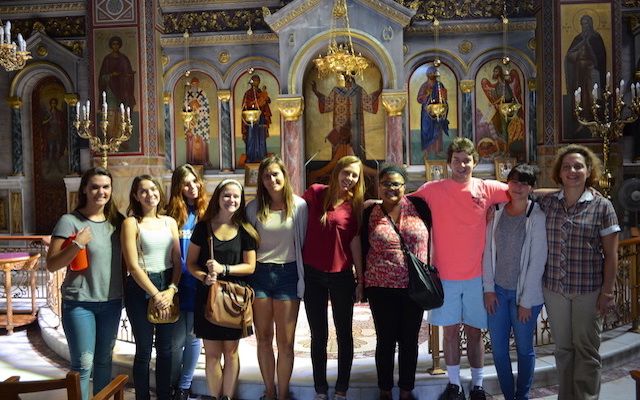
Tuning into students’ minds and feelings
By DESPINA IOSIF*
Frequent on-site visits, providing opportunities for hands-on experience and volunteer work and challenging students to get out of their comfort zone is vital for both my classes.
Teaching at an intellectually demanding program like CYA is exciting. My goal is to make students share my genuine enthusiasm for the history of religion. To this end I try to tune into the minds and feelings of my students, eagerly interact with them, actively involve them, encourage critical and creative thinking, intrigue them, ‘reach and not just teach’ every student under my care.
The course I have been teaching every fall semester since 2007 is ‘The Religions of the Middle East: A Comparative Approach’ which serves as an introduction to Judaism, Christianity, and Islam, and it is organized thematically as a means of trying to capture the key differences as well as similarities among the three ‘Abrahamic’ religions.
Every spring semester I teach the Orthodox Church course. I venture to explore along with my students Orthodoxy in its historical and modern contexts. I acquaint students with the landmarks of the history of the Orthodox Church, inspire them to appreciate critically the influence of Orthodox Christianity in shaping human experience, invite them to explore how Orthodoxy is lived and practised in Greece, call them to exhibit awareness of their own experience of religious tradition and commitment and differences in perspective and opinion.
Frequent on-site visits, providing opportunities for hands-on experience and volunteer work and challenging students to get out of their comfort zone is vital for both my classes. We visit Orthodox churches and observe how the congregation expresses its piety; we visit monasteries and interview monks and nuns of their unique religious experience, visit museums that house typical and rare religious artifacts.
Recently, a student inspired by a class he spent some days at a Mt. Athos monastery, (where Christianity is practiced with the strictest standards available, like nothing has changed since early Christian times, and where services can last up to 12 hours) and followed the daily schedule of the monks. When he returned he expressed his enthusiasm about the unique experience.
* Despina Iosif is a historian of theology. She received a BA in History and Archaeology and an MA in Ancient History from the University of Crete and a PhD in Early Christianity from University College London. She conducted her post-doc on Late Antiquity at the University of Thessaly and research on Monotheism at the Fondation Hardt in Geneva. Among her academic publications are the following books: Early Christian Attitudes to War, Violence and Military Service, (Gorgias Press, 2013), Apocryphal Acts of Paul and Thecla, (Katarti, co-authored with M. Triantafyllou, 2008) and The Byzantine Empire, (OTEK, 2008), and articles: ‘“Early Christian Aloofness and Participation in the Pagan World”, in Cults, Creeds and Identities, (Peeters, 2013), “I saw Satan fall like lightning from heaven. Illness as Demon Possession in the World of the First Christian Ascetics and Monks”, (Mental Health, Religion and Culture, Routledge Journals, 2011) and ”Augustine on Religious Coercion” in Augustine. Literature in Context, (Cambridge University Press, 2016). She has taught at University College London, University of Komotini, University of Crete and University of Zaragoza. She presently also teaches for the Hellenic Open University. Link to papers published on academia.edu: https://eap.academia.edu/DespinaIosif





